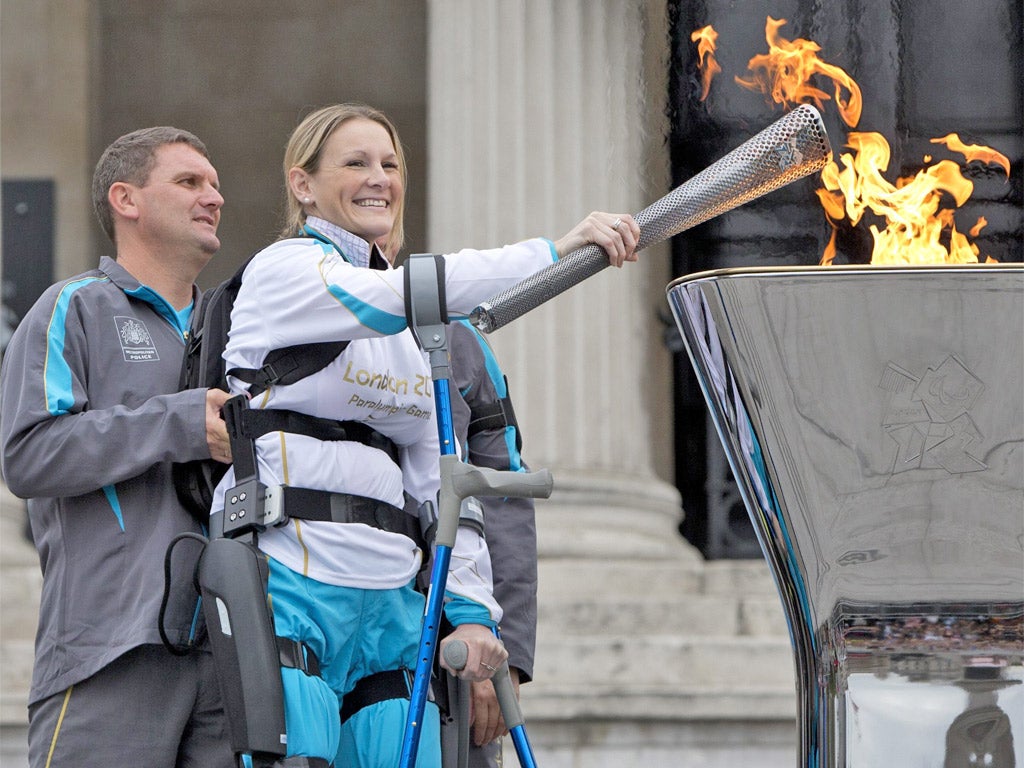Shelagh Fogarty: Outside the Games, not all can scale heights
Many struggle to come to terms with the new life they are supposed to lead

The motto of the Paralympic Games is "Spirit in Motion" so, as the "superhumans" continue to dazzle at the Olympic Park and beyond, it took a conversation with Clare Lomas to remind me not all people with disabilities can find it in themselves even to live with it, let alone scale the heights of Paralympic sport.
Clare was a very successful equestrian when a riding accident left her, at the age of 27, paralysed from the chest down. She had broken her neck, back and ribs doing the thing she most loved. Her most recent and high-profile achievement is finishing the London Marathon in 17 days. She wore what's become known as a "bionic suit" – a computerised frame around her limbs and body which allows her to stand and move.
It's been used in hospitals and rehabilitation units for some time but Clare has been the first person to take one of the ReWalk suits home and try to incorporate it into her daily life so transformed since the riding accident. She tells me it allows her to walk upstairs and, most importantly to her, stand eye to eye with people socially when she wants to. It's very easy for a person in a wheelchair to be unwittingly ignored or blocked out by those of us in the standing world – one of the many apparently small consequences of spinal injury which people in chairs deal with on a daily basis.
So, as I marvel at the achievements of the athletes I've seen at the Games, Clare reminds me that there are countless individuals who've lost the use of their legs one way or another who struggle to come to terms with the life they are now supposed to lead.
Some never do. The physical implications go way beyond movement. Blood circulation, digestion, weight gain – all factors.
Nuneaton rugby club hooker Daniel James felt his body had become a "prison" and lived in "fear and loathing" of his daily life, according to his parents who accompanied him to a Swiss euthanasia clinic. He had attempted to kill himself several times since March 2007 when a scrum had collapsed on him and dislocated his neck vertebrae, trapping his spinal cord and rendering him tetraplegic.
Clare says she found it hard to see the rapid change in her body after her accident. She'd been superfit and active, and to watch her legs wither in muscle mass and become what she describes as "floppy" caused her a lot of distress. Her boyfriend at the time wasn't immune either. After 10 months of trying, he admitted he couldn't handle it. So, rejection on top of loss for Clare.
Enter Matt Hampson, another young rugby player paralysed in play. Like Daniel, the scrum collapsed on him, trapping his spinal cord as it did.
Unlike Daniel, Matt still wants to live. His foundation helps people who are new to it all and perhaps especially those who simply think they can't cope.
Clare Lomas believes powerfully that no amount of encouragement will provide the breakthrough to accepting your new way of living. When it comes, it comes from inside. She says a friend of hers died recently after a long struggle with her condition – the body "packing in" because the spirit already had.
The Matt Hampson Foundation provides advice, support, relief and/or treatment for anyone suffering serious injury or disability. To donate, please visit: www.matthampsonfoundation.org
Subscribe to Independent Premium to bookmark this article
Want to bookmark your favourite articles and stories to read or reference later? Start your Independent Premium subscription today.

Join our commenting forum
Join thought-provoking conversations, follow other Independent readers and see their replies